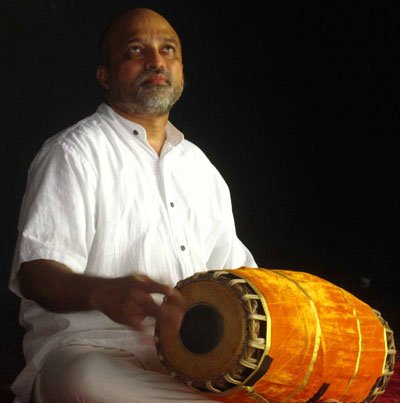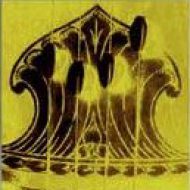
T. R. Sundaresan (Chennai) is a versatile percussionist with “A-grade” ranking at the national Indian broadcasting service (All India Radio). He performs several South Indian percussion instruments with equal virtuosity: Mridangam (the double-sided main drum of Carnatic music), Ghatam (claypot), Kanjira (small tambourine), Morsing (Jew’s harp) and Konnakkol (rhythmic solmisation)
T. R. Sundaresan’s mridangam was soft, soothing and efficient – The Hindu (online edition), Friday, Dec 20, 2002
Skype lessons
For inquires, please send a message via Skype to:
T.R.Sundaresan TRS
or by email to: sundaresan_mridangam@hotmail.com
Homepage
www.trsundaresan.com
Experience
From 1984, T.R. Sundaresan taught drumming at Kalakshetra College of Fine Arts, the international centre for classical Indian dance and music.
From 2004 to 2013 he taught at the Singapore Indian Fine Arts Society. Since then he travels the world as freelance performer and gives masterclasses at several institutions (e.g. Chandrabhanu Bharatalaya Academy in Melbourne, Australia).
On many occasions, T.R. Sundaresan has performed with leading exponents of Indian music abroad:
Festivals of India in Germany and Russia with Ravi Shankar (Sitar), Rajeswari Padmanabhan (Vina) und Karaikudi Mani (percussion-ensemble).
Guest lecturer in several Europen countries where, together with Ludwig Pesch, he has also introduced Carnatic music in the context of German rehabilitation projects. Together they have toured and conducted numerous workshops.
Indian music night broadcast live by SFB (Sender Freies Berlin), Berlin 3 June 2001.
Co-author of Eloquent Percussion and The Oxford Illustrated Companion to South Indian Classical Music (Oxford University Press).
Broadcasts for BBC (London), WDR Köln and SFB (Germany), VPRO and Radio4 (The Netherlands)
YouTube channels & more
- https://www.youtube.com/c/SannidiAcademyOfMusicandArts/videos
- https://www.youtube.com/user/Rhythm43759
- Layavinyasam: Navarasa Navarthri
- TR Sundaresan on this website
- A musical tribute to Dr Pia & Prof SA Srinivasan
World record
He established a new record for non-stop percussion playing by accompanying a vocal and instrumental ensemble of some of the finest musicians in Singapore and performing solo for 42 hours: Sunday 1 May 5:00 a.m. until Monday 2 May 2005 past 11:00 p.m.
Video documentation
Haus der Kulturen der Welt Berlin: Festival der Saitenklänge 1991. Karnatische Musik aus Madras / Südindien; Rajeswari Padmanabhan, Sreevidhya Chandramouli (Vina), T.R. Sundaresan (Mrdangam); Pia Srinivasan (Tambura).
Classical music archives of the Museum of Anthropology Berlin (Preußischer Kulturbesitz).
Internet live broadcasts
Lueneburg University, 27 May 2002; with Bhushany Kalyanaraman (vocal) and Pakala Ramadas (violin).
VPRO – World music rogramme “De wandelende tak” by Walter Slosse, Amsterdam 31 March 2003: Live-Konzert by Sreevidhya Chandramouli, Carnatic vina (streaming-audio, VPRO Internet-Archive).
Reviews
“a magnificent, inspired performance by a masterful mridangist! It was a privilege for kanakasabha to witness this fabulous (and fabulously organized) event.” –www.kanakasabha.com on the 42 hour record Mridangam performance by Shri T R Sundaresan – May 1, 2 2005
“T.R. Sundaresan on the mridangam enhanced the concert throughout with good alignment to the songs and sensitive support. His thani along with A.S. Krishnan on the morsing capped a good concert.” – The Hindu
“A Journey through the Realms of South India: German flautist reveals a rare music culture” […] Together with T.R. Sundaresan, [Ludwig Pesch] presented the music of three great Carnatic composers, Tyagaraja, Syama Sastri and Muttusvami Deekshitar who lived two centuries ago. The main piece began with an elaboration of raga Todi. Pesch presented an incredibly beautiful and inspired solo improvization. Eventually T.R. Sundaresan joined to provide subtle percussion accompaniment. This he followed up with an elaborate solo during which his impressive skills could unfold on the mridangam (drum), kanjira (tambourine), ghatam (claypot), morsing (Jew’s harp), and konnakkol (solmization). In terms of rhythm and composition, his virtuosity proved to be unique.”– Berlinske Tydinge, Copenhagen
Charming Carnatic music […] Clarity was distinguishing feature of this music … great suppleness … T.R. Sundaresan enhanced the melodic line … whether by way of outlining the underlying rhythmic pattern or by inverting it and turning it upside down … Carnatic music appeals in a direct manner and is also characterized by a degree of playfulness … altogether a splendid introduction to a music that deserves to be known much more widely.” – Eindhovens Dagblad , The Netherlands
More about the above person(s) and topics
Periodicals and sites included | More resources | Disclaimer >>
Learn & practice more
- A brief introduction to Carnatic music (with music examples and interactive map)
- Free “flow” exercises on this website
- Glossary (PDF)
- Introduction (values in the light of modernity)
- Video | Keeping tala with hand gestures: Adi (8 beats) & Misra chapu (7 beats)
- Voice culture and singing
- Why Carnatic Music Matters More Than Ever
- Worldcat.org book and journal search (including Open Access)
